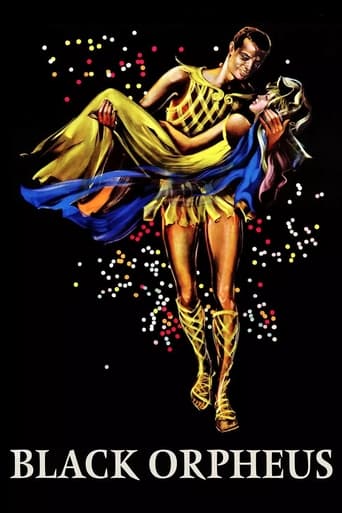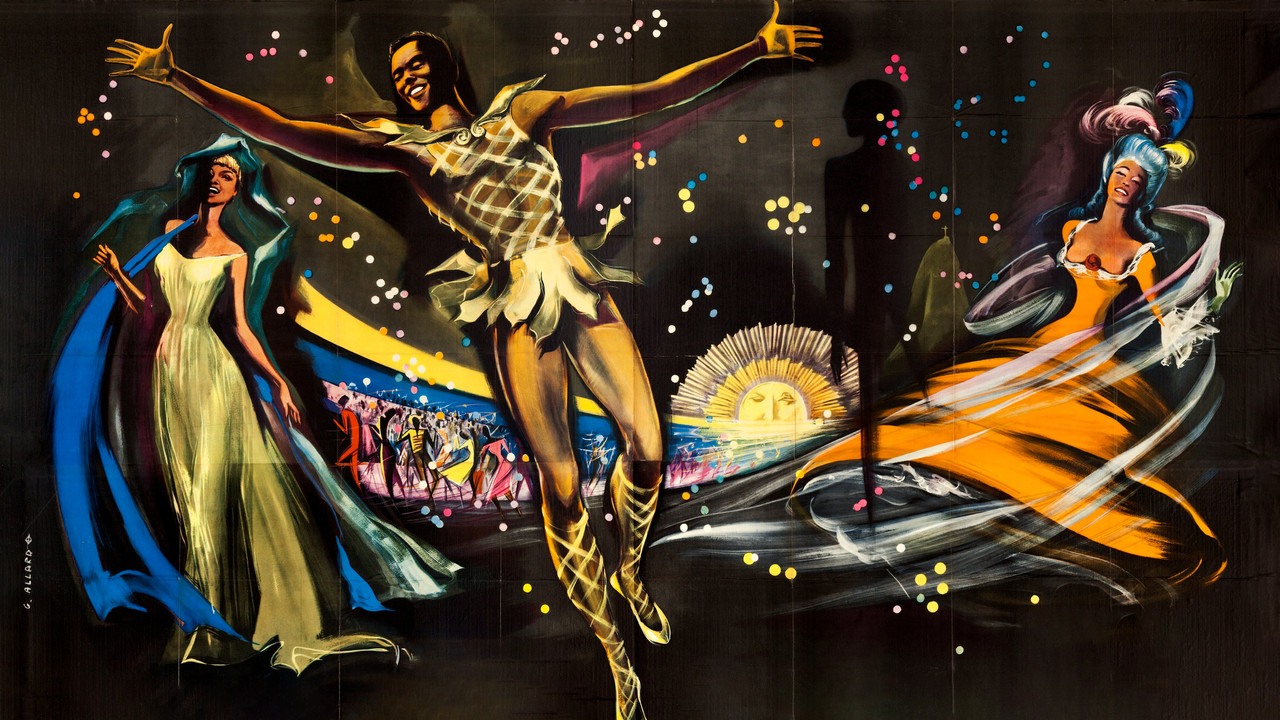Antonius Block
Director Marcel Camus grabs us from the outset in this film, with the energy of samba music playing as women return to their village carrying large containers on their head. Children are scampering about and they're on a hill overlooking Rio de Janiero, surrounded by stunning mountain peaks and beautiful bays below. The film takes the classical tale of Orpheus and Eurydice and adapts it to Brazil at the time of Carnival, and while I liked the mythological reference, it was the setting, cast, and overall vibrancy that really had me enjoying it. How fantastic it is to see all this color and energy in a film from the 1950's. The cinematography is excellent, with those beautiful vistas and sunsets, and quite a few street scenes as well. There's also some great music, with the spontaneous wailing and drumming in the streets offset by a couple of love ballads with touching lyrics.The central characters of Orfeu and Eurydice are played by Breno Mello and Marpessa Dawn reasonably well, and it was fascinating to me to find out later that Mello had never acted before. Camus saw him on the street and asked him if he wanted to be in a movie, and then he was the star. Orfeu is a ladies man engaged to the vivacious Mira (Lourdes de Oliveira), but he's drawn to the simple purity of Eurydice, who has come to the city for the first time. It's a good-looking cast, and hard not to be drawn by its magnetism. The supporting roles are fine too, starting with Serafina (Léa Garcia) and Chico (Waldemar De Souza), who engage in delightful banter. The two little boys (Jorge Dos Santos and Aurino Cassiano) are also a joy to watch.Sensitivity surrounds the film, since dancing and partying are stereotypes some hold of Brazilians or people of color in general, e.g. reducing them to simple-minded people who do nothing else. I can see the concern and understand a possible negative reaction, and it carries even greater weight when it comes from Brazilian themselves, or the likes of President Obama. I confess I have not had to live with the consequences of these types of stereotypes, so you can take my opinion for whatever it's worth, but I saw it as a celebration of the culture, and it was fantastic to see the diversity. The characters are not single-dimensional, and I enjoyed seeing the love and tenderness alongside sassy playfulness in the romances. As for the lack of realism, well, it's a Greek myth adapted to Carnival, so it's fantasy by definition - and certainly meant to be a complete view of life in Brazil. You have Death chasing Eurydice around, for goodness sake. In adapting the myth, I wish it had been more closely tied to the classical story. It's interesting to me that amidst all of the colorful, wild, chaos of Carnival, which is an extreme representation of Life, we have Death so near, and maybe that's one of the points. The film drags a bit towards the end, though the final scene of the three children dancing nicely lightens the tragedy. Overall, well worth watching, and quite a unique film - just be mindful of the sensitivity.
tylergee005
I'd never heard of this film before I stumbled on it at my local library, but I was instantly intrigued. Disappointed however. I'll keep this brief.The constant beat in the background was interesting and vibrant, but really did become annoying when dialogue is being exchanged, especially when everyone in the film acts like a complete character of a weird hyper active child. Seriously the acting was probably the worst thing in the whole picture. It was obnoxious and illogical most of the time. Also typical plot holes, like why the women just kept running away from the masked man, instead of being protected by the people around her? Especially towards the end when there are COPS that she literally runs into, but doesn't seek help. Really obnoxious. There's more that makes this a really unenjoyable watch, but mainly it has a 15 minute plot stretched to an hour and forty minutes, filled with people acting way over the top, and loud thumping leaving this film with nothing more than a headache. PS I'm 21 so it's not because I'm too old for the noise!!
disinterested_spectator
If you decide to watch this movie, I hope you like dancing, because that is what half the movie is, and it is monotonous, repetitive dancing to monotonous, repetitive music.The movie is based on the myth of Orpheus and Eurydice, but it's not any better than the myth was. Orpheus asks his girlfriend Mira to marry him, and then on the same day, he meets Eurydice and has sex with her. Then, instead of at least breaking off his engagement, he just dances with Eurydice at the carnival in front of Mira. So, he's a louse, right? Wrong. The movie wants us to like Orpheus and despise Mira. You figure it out.Anyway, there is a guy running around with a death mask on who wants to kill Eurydice and eventually succeeds. We don't know why, because she says she never had anything to do with him. I guess we are supposed to accept this as mythologically inevitable. Or, you can just assume the guy is wearing a hockey mask.
tomgillespie2002
Eurydice (Marpessa Dawn) arrives in Rio de Janeiro in time for the festival to escape a man whom she believes is trying to kill her. She catches a tram driven by popular playboy Orfeu (Breno Mello), who naturally falls for Eurydice's youthful beauty. Ofeu is engaged to Mira (Lourdes De Oliveira) but is particularly unenthusiastic about the idea, and uses his new pay packet to get his guitar from the pawn shop in time for the carnival rather than to buy Mira an engagement ring. Discovering that Eurydice is staying next door to him with her cousin Serafina (Lea Garcia), Orfeu falls in love with her. But during the carnival, the man Eurydice believes is trying to kill her tracks her down, revealing that he is in fact Death dressed in a skeleton costume and has come to claim her.Winner of the Palme d'Or at the 1959 Cannes Film Festival, as well as the Academy Award and Golden Globe for the Best Foreign Language Feature, Black Orpheus is a rather strange beast, and the surprise victor in a year that saw Francois Truffaut's The 400 Blows and Alain Resnais' Hiroshima Mon Amour released. Although it can be argued that these are technically better films, it's not hard to see why Black Orpheus won, as its sheer individualism in its beauty, colour and culture makes it stand out above the rest. Many directors, including Orson Welles, had tried to capture the wonder of Rio's carnival, but French director Marcel Camus somehow manages to place you there amongst the samba and the sun, yet never letting the visuals overshadow this poetic, and actually very funny, re-telling of the Orpheus myth.Perhaps the most popular telling of this story in film is Jean Cocteau's Orphee (1950), the central film to his Orpheus trilogy. Cocteau invested his own ideas of surrealism, poetry and art into his film, and was more re-interpretation than re-telling, and as magnificent as that film is, it does tend to ignore the thing that Orpheus was known for, which is his almost God-like gift for music. Transporting the story to Rio's carnival, an explosion of tribal samba amongst an array of outlandish costumes, writhing bodies, and beautiful women, brings the story to life, and rather than Gods, we have voodoo doctors and fancy dress. It seems strange that Marcel Camus has done nothing of any real note since this film's success, as he somehow manages to juggle neo-realism and fantasy to a stunning degree, and created one of the most memorable films of the 1950's.www.the-wrath-of-blog.blogspot.com


 AD
AD



